Paperwork Harlot and the Displaced Bishop
While Henry is away the paperwork of the Kingdom of England has decided to start seeing a Regent.

Now, Anne Herbert, Katherine’s lady in Waiting and sister, has been asked to introduce a visitor and she’s not stoked about this meeting being on the calendar at all. The visitor, Mr Latimer, a man in full church dress, gets a little disapproving look as Anne introduces him, she doesn’t curtsey and she hangs out in the back, rather than leaving.

Mr Latimer, revealed as Hugh Latimer in a later scene, should not be here actually historically. Generally speaking Katherine Parr’s household clergy were small ‘c’ conservative. Of the men in her household only her Master of Horse, Robert Tyrwhitt and her doctor, Robert Huick were in the realm of Protestant reformers. Bar those two, it was the women of her household that were the hotbed of Protestantism. (1)
Hugh Latimer is an actual historical figure of an appropriate ball park to just air drop right in here, as that is apparently what we’re doing, being a famous clergyman and Protestant martyr of the right period. In fact, he’s one of the other two members of the Oxford Martyrs that weren’t Cranmer, and therefore kind of a big deal in the early Anglican Church. He might well have been someone Katherine Parr had met and heard preach, but he wasn’t ever her chaplain. Hugh Latimer was Katherine, Duchess of Suffolk‘s chaplain, Brandon’s not actually historically estranged wife, who was part of the Queen’s circle, one of the ‘Great Ladies of the Bedchamber’ (She was the lady with the dog called ‘Gardiner’) and was growing into one of the factional leaders of English Protestantism but even she didn’t employ known Protestant agitator Latimer until well into Edward’s reign.
Here Latimer could be said to be a bit of a stand in for Cranmer who was still Archbishop of Canterbury and Katherine Parr’s biggest male religious supporter, and a man still somewhat in government, but who, as a character, does not come back to The Tudors after the end of Season 2.
In The Tudors Latimer and Katherine bond quickly and easily. She sets up a bit of a strawman for him (I hear too much gospel reading is bad?) he bats it away with an exquisite argument, and she delightedly comes in to agree with him, physically closing the distance between them with open arms in her excitement at finding a kindred mind.

Her reaction tells him all he needs to know and he accepts her actually fictional job offer, while Suzy Lawlor continued to give 2010’s “Out of Focus Performance of the Year” as Anne Herbert about 15 feet back.
Queen Katherine does ask that Hugh Latimer keep the Protestantism on the backburner any time he’s talking to Mary. The Tudors‘ Katherine Parr recognizes and is ready to accommodate, even appreciate Mary’s intense Catholicism, and Latimer says she should have no worries, he will be a model of discretion with all the King’s children, and the World.
But sister Anne certainly remembers the Katherine Howard situation and how it ended.
Because in The Tudors sister Anne came through the Katherine Howard situation carrying the heads of two incredibly recently deceased people she knew well.

So if sister Anne came up to you, as Queen, about 18 months later and said “I’ve got some big concerns about this. This is maybe dangerous.” perhaps you’d be given pause, maybe rethink your options a bit.
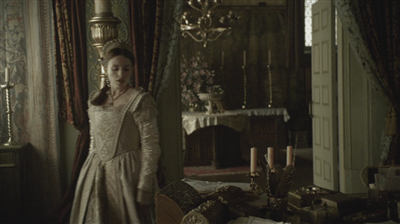
But religious zealotry is a hell of a drug, because QKP’s reasoning is basically:

So Queen Katherine is going to get paid for marrying Henry by making it an opportunity for forwarding The Protestant Cause. In Katherine’s defence she doesn’t go into denial that there’s a problem or get aggressive, but she does say that this is something she has to do, and asks for Anne’s understanding, and implicitly for Anne to start running a degree of risk along with her.
Anne has been not been won over, but can just about manage acceptance. She knows it’s a mistake, as she should, this whole set-up exists to move the plots against Queen Katherine up a notch and the entirely fictional appointment of Hugh Latimer is the trigger.

Boulogne Gumbo
The scenes in Boulogne manage to do a lot without a huge amount of historical content. The seasoning is good. An underlying flavour of Boulogne is that this kind of invasive warfare is an act of will and suffering. If you’re going in to take someone’s town, where their family lives, and their home and life is built they are going to hold out hard, and war is ugly anyway. We never see the full measure of suffering as we spend little to no time in the town with the civilians, but we will see the death and suffering of Henry’s own troops. That’s still a little way away, but The Tudors’ Boulogne is appropriately never going to look as bright and clean and heroic again as it did when they first landed.
We start the downward slide, Englishly enough, with some historically accurate rain (The weather was bad around Calais for a lot of the siege (2)) viewed by our two “window on the working class” soldiers, Richard Leland and Harry Hirst doing an optimist/pessimist thing with the weather.

Occasionally, like a prawn, a chunky historical nugget will drift into view.
Actually Historically there was an Italian artist and engineer named Girolamo De Treviso present in the court of Henry VIII. He was mainly employed by Henry as a military engineer and went on the campaign to Boulogne. (3)


This is before Europe invented their first tripped land mine in 1573 (It involves gunpowder and engineering so at this point in history the Chinese were about three centuries ahead on landmines – thankfully for Europe’s ego we didn’t know that at the time), and in Henry’s time ‘mine’ was a military term that referred to both caches of explosives to be remote detonated and the tunnels made under an enemy position that housed those caches of explosives. It was a word that meant the whole thing and as uses diversified has split into multiple meanings (The mine exploded – I mined into the hill).
Girolamo wants 2 diversion tunnels, which seems excessive. But mine works were indeed a central part of the siege of Boulogne, and the final blow that took the town in early September was a big explosion from a mine which took out the Castle. (2)

Henry and Girolamo (and let’s give Henry some points for employing a court military engineer in the 1540s) talk about the variables, the chances of success, the time it will take and why. Girolamo carefully argues out a timescale with thought and precision, but Henry just slashes away a third of the build time.

And Girolamo’s face says he was giving his best estimate, there. That timescale is just not possible, and Girolamo now faces at least 2 and a half weeks of trying to do the impossible for a results-orientated tyrant. Also Henry arrived in Boulogne in late July and the English mine took out the castle on the 11th of September (2a), so that’s a really compressed timescale the Tudors is on.
We’re taken on a montage to meet Girolamo, presumably after a few days because the tunnel we see is quite advanced.

Still, being the Engineer means Girolamo gets to take breaks outside of the hot tunnel, with his calculations, measuring devices and a cup of something.

Harry Hirst has advanced digging abilities, that came in his Farm Labourer skill set and they have proved very useful to his country. He’s in Girolamo’s work team and gets to take his break by taking his helmet off and gulping some air for about 20 seconds when he carries the spoil out.

And then to get his arse right back down into that hot, dangerous, French hole in the ground.
We cut to a meeting of Henry’s Council discussing the Alliance in Henry’s base tent which, Actually Historically, was pitched to the northeast of the town, well outside the range of any returning fire and with good access to the sea and fresh water (4). Richard Rich is visiting the king at Boulogne, as he and other councillors based in England did for a few days at a time to get news and official instructions.
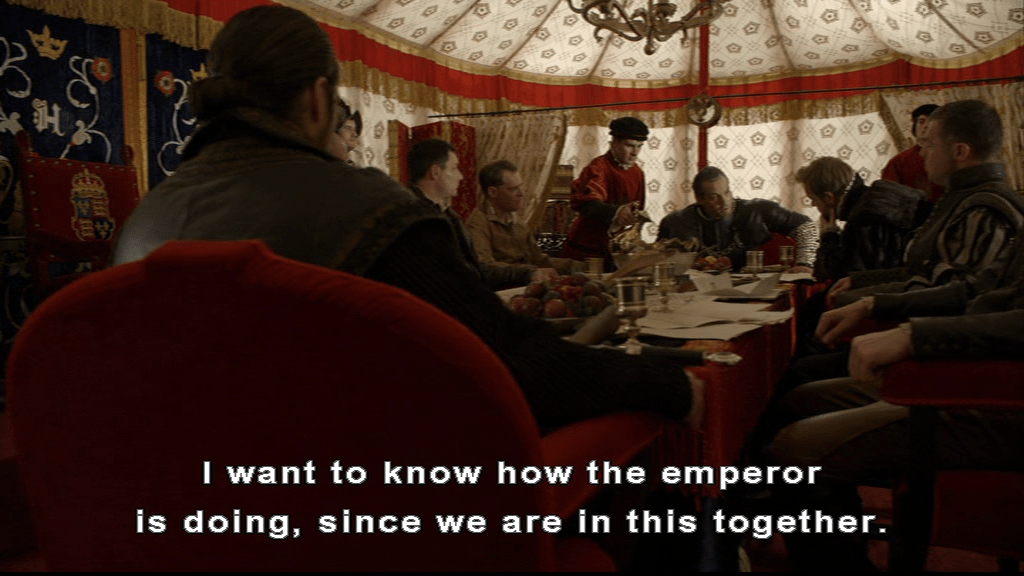
The answer to that is that the Emperor is doing well.

Luxembourg was where the Emperor first attacked. It is at the intersection between France, Belgium and Germany, about 250 miles east-southeast of Calais and is now a small nation state. At the time it was an Imperial Grand Duchy that was one of the few places the French had managed to capture in the last round of Continental War. It fell back to the Imperials quickly this round, during May and June. Saint Dizier was just a town rather than a Grand Duchy, which the Imperials reached on 4th July. But Saint Dizier had the latest thing – an Artillery or Bastion Fort which were forts designed to be effective against gunpowder artillery. French design and determination put up an effective defence there and it was not captured until August 17th, and that left Charles and the Imperial Army still a good 200 or more miles from Paris (5).
Meanwhile, the English command are having confident but self-comforting conversations about how our cannons are awesome and the French will surely not hold out for long.

In fairness, the English bombardment was impressive, with around 100,000 canon stones fired into Boulogne (6).
But hello, what’s this? Looks like a sneaky Frenchman trying to get out of the hell hole we’ve turned his town into.
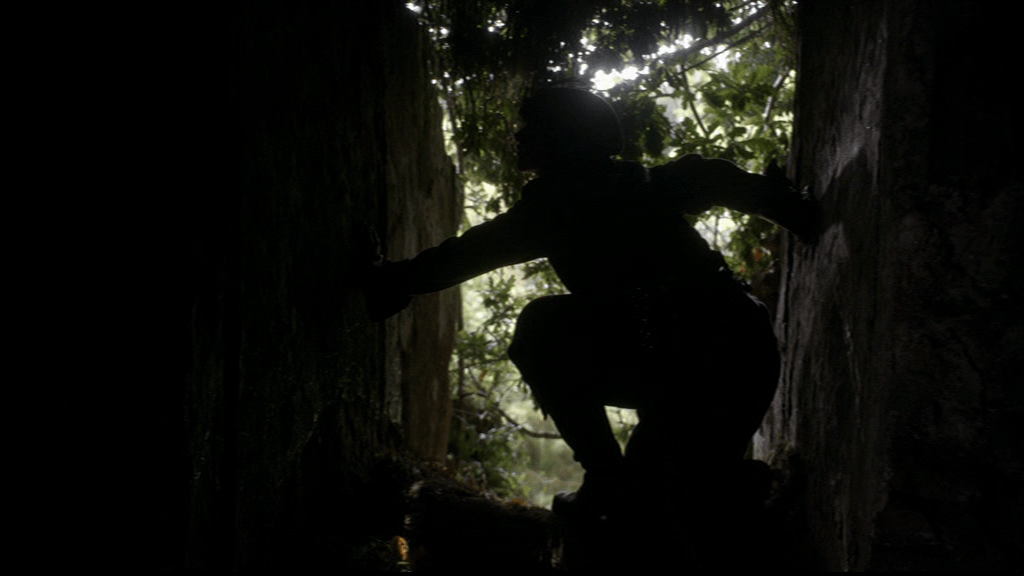
They’ve got themselves a secret tunnel, and while Surrey cracks jokes about killing Frenchmen so he can sleep with their wives there’s two or three of them sneaking out.

The news that there’s a shitload of Frenchmen breaking out gets to Henry’s Control Tent satisfyingly quickly and Surrey quickly calls dibs on taking some action. There’s some actual historical basis for the following scenes, if only that skirmishes with the French were happening from the beginning right into late August at Boulogne. (7)

Henry’s other decision, to have Suffolk commit a large part of his forces in case this is a diversion isn’t terrible. It’s pretty abrupt but it demonstrates that Henry’s got his eye on the main objective. Miss a small break out, and it’s not the end of the siege, but if you miss a full on assault, it could be.
The Running of the Frenchmen
We catch up with Surrey in the woodlands. Actually Historically he wasn’t here, but was currently Field Marshal for his father’s forces who were besieging Montreuil (The next large town along the coast and to the South). He did get involved in skirmishes there and at Guines, including one that killed the French commander. (8)
In The Tudors there is a running of the Frenchmen in the woods that day. Surrey and his men find one on his own and chase him down. Surrey has learned some of the language but is having absolutely nothing to do with the French accent.
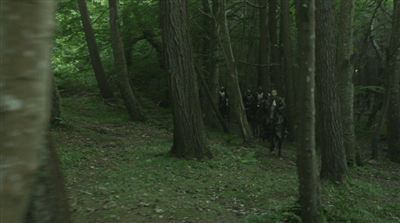
And the cunning Frenchman runs into a bit of a dell with steep sides and some large rocks on the way down, where the horses cannot go. Handily removing the English advantage in this completely random place he seemed desperate to get to.
Once they are down there, Surrey has some useful advice for his men as they walk into this obvious trap.
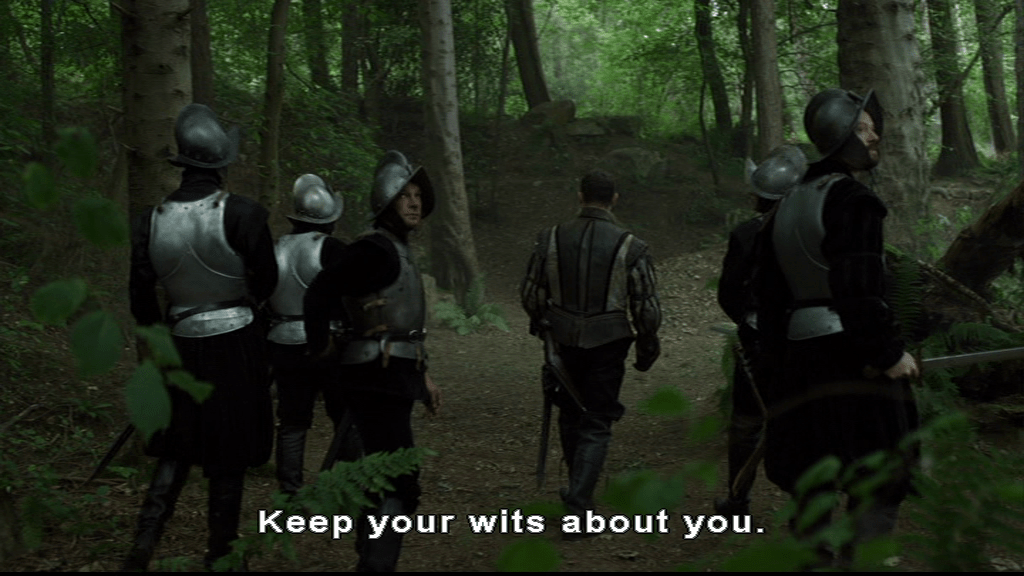
Although Surrey only gives the order to actually take cover instead of just strolling up it looking mean and pointing your sword once two of his men are hit.

The Turning and Fighting of the Frenchmen
Surrey gathers his competence, and together with one of his men, aggressively informs the French snipers that they have brought crossbows to a wheel lock pistol fight.

On the other side of the dell, there are suddenly 4 or 5 Frenchmen shouting defiance and charging. Surrey and his men are up and charging at it too when the Frenchmen start running into forcefield level arrows, brushing aside the Frenchmen like they’re powered by pure weaponized charisma. But what could cause that…

Oh, of course Suffolk ditched his orders to save your ass from a fight you could have won. I’m kind of with Surrey’s bitchy ‘Thank you’, but fair’s fair, when the hillside then erupts in Frenchmen it’s good to have Captain Impeccable in your side. You know he works out a lot and he basically runs on patriotism. Suffolk was actually historically noted as being actively involved in military actions in the early campaign(9) despite advanced age, and perhaps at this stage a degree of ill health (Brandon was 7 years older then Henry – 60 years old in 1544, and would die the following year).
The fight starts and sometimes is ‘big brawl’y.

And sometimes is more ‘medieval murder’y.
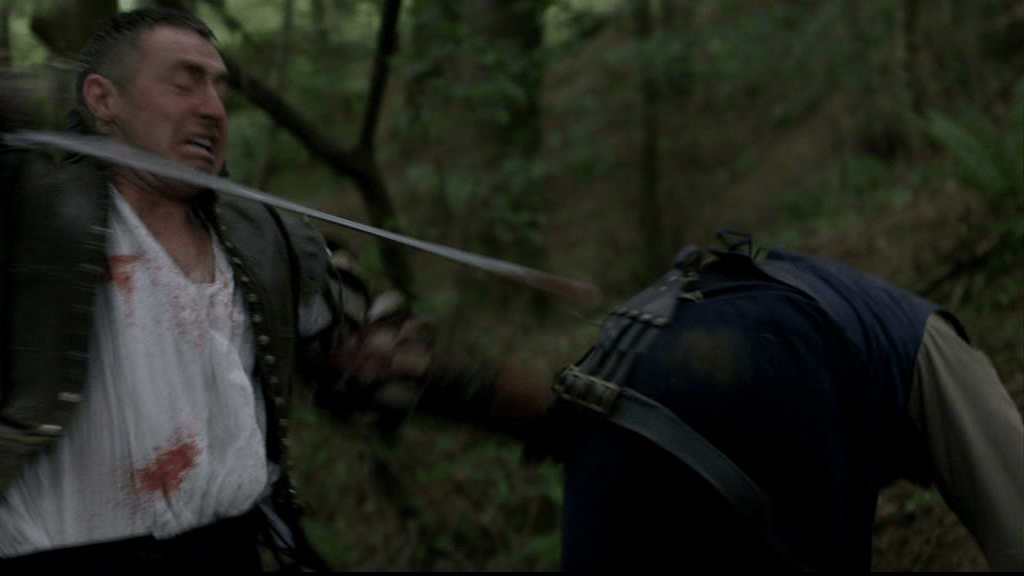
And Frenchwoman that failed to Commit to the Bit
Suffolk crosses swords and ends up in a sub fight with a man that will turn out to be Brigitte’s father. He defeats and slices him across the belly, and Brigitte cries out and runs towards her father saying “Papa, papa”. But Brigitte was already in trouble at that point because her hat had fallen off.

Although her disturbing lack of forward planning is about to work out for her right now. She gets unmasked about 6 feet away from His Grace the Duke of Chivalry and Suffolk, who looks over at Surrey.

And I find I am not reassured by that look.

Brandon is also not reassured by that look because he looks over at Surrey again before clearly deciding she’s going to be safest with him. And he’s right. An unexpected survival plan just unfurled and it is going to be accomodating. If you like Charles Brandon, this survival plan looks amazing. If you don’t like Charles Brandon, well, you’ll still be fine, too. Your stay will be a little duller, but he’ll probably get you a book or something.
Because The Tudors’ Charles Brandon has been in a committed relationship with Honour for some time.
The French Perspective
Back at the British base camp, Brigitte is being held prisoner in a tent.
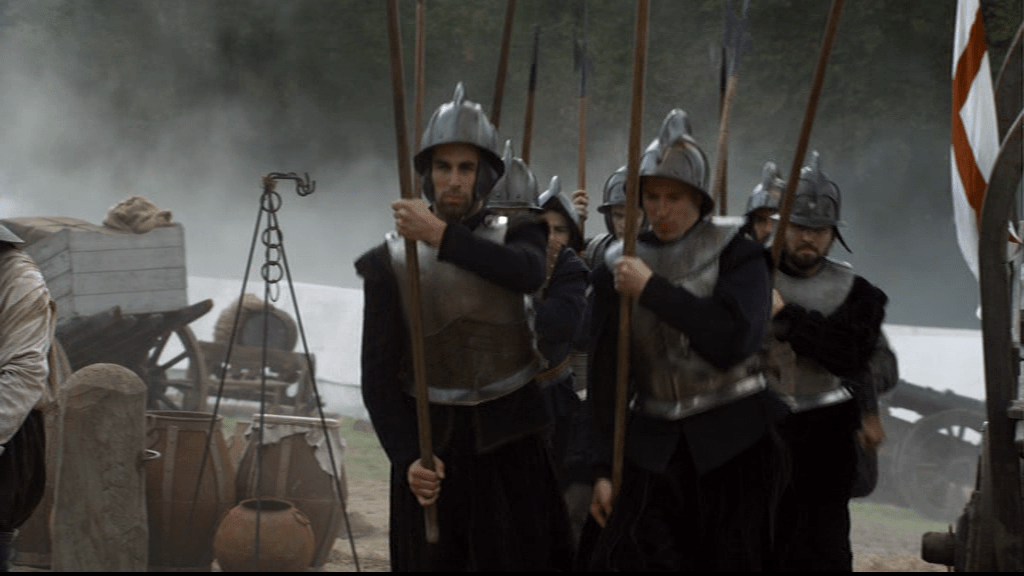
Brandon tells her guard to go and take a break. Brigitte seems a little spiky to begin with, angrily pointing out that she’s not hungry when offered food. Then Brandon tells her that her dad is still alive and she cracks like an egg.

Brigitte prods at Brandon’s justifications for the war, and he points out that the region of France they are in used to be part of England.
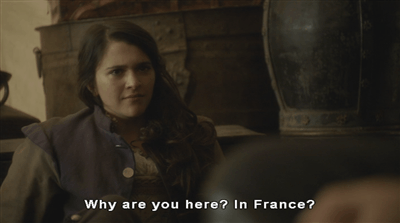
Well, alright, but only because the history’s been a little light this recap.
The Whole Franglais, Served Hot.
In anything not out of legend, English ambitions in France started with a sudden reversal – If you get successfully invaded by Normandy (1066) but you are clearly the bigger territory you kind of own Normandy now, (even if it does take an invasion back at one point) at least until William the Conqueror’s last son Henry I dies (1135), and the English nobility freak out about a ruler possibly being female.
Then, when a woman wants to rule a country very, very much and she’s forced out by misogyny, entrenched power and soldiers, sometimes she has to marry a low ranked Frenchman with huge tracts of land that she doesn’t even get along with. If their son then marries a Frenchwoman with even bigger tracts of land, and inherits the English Crown anyway from his uncle, then suddenly there’s a thing called the Angevin Empire that’s basically England and Western France and you’re living in it (1154-1214).
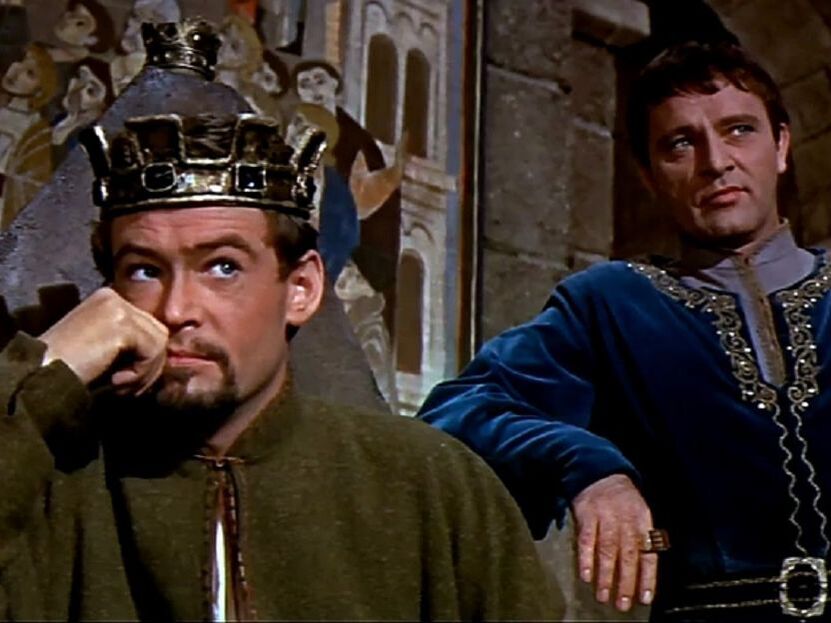
That son, Henry II also worked his empire and expanded it through political pushing and invasion later on. But it was too big to rule without functional bureaucratic systems, and Henry had a big family with a lot of ambitious sons. This one of a kind Anglo-French empire, ruled by an Anglo French royal family, was at war with itself in Henry II’s reign, and everything over the channel broke off whenever France had a king with his shit together, to become part of France again, in the reigns of Henry’s sons.
All except for Aquitaine and Gascony, (South-West France) which were Anglo-hanging on in there for a couple more centuries.
Henry III, grandson of Henry II, launched a deeply ineffectual invasion in 1230 and then both parties didn’t have a war (at least with each other) for about 100 years, while Henry III closed his reign out, his son Edward I was far more interested in conquering Wales and Scotland, and his son Edward II was far more interested in being gay and terrible at politics, and getting usurped and being murdered.
Which brings us up to his son, Edward III.

In the 1320s the French nobility noticed just how very close Edward III was to maybe inheriting the French crown via the claim of his mother, Isabella of France. The still very new law (later called Salic law – still only a decade old when this happened) that women couldn’t inherit the French Crown, suddenly needed…clarification that obviously, totally implied in that, was that they couldn’t transmit any claims to their male children either, was what it would have said, if it had needed saying, which it didn’t.
And just like that, Edward III was suddenly not next in line for the French Crown. Edward was about 16 when Philip VI inherited France instead of him. Edward had already become the ‘But I got an unofficial Regent’ King of England at 14, lived in an age of peak teen dramatrauma, and aced his ‘Hamlet but Metal’ themed graduation at 17 when he overthrew his de facto regent, Roger Mortimer, the guy running the country, who was also the guy that probably had his father killed, and was definitely his mother’s lover, and despite his mother’s pleas had ‘Uncle Roger’ executed at Tyburn in what had to be a very cleansing year. And for the violently competitive job of Medieval Monarch, a very promising start.
Edward III was in his early twenties when Philip VI demanded homage from him for his French territories and 25 when Philip declared Edward’s somewhat sullenly given homage as not good enough and that he was taking all Edward had left in France back.
And that was when Edward III decided he’d just about had enough of being mistaken for a complete pansy that would never start a war and started the Hundred years’ war (Actually a war that lasted 116 years, with one 10 year break and one 24 year break for the Black Plague and some home dynastic dramatrauma).
It was the middle ages and it was war so no matter the founding of the order of the Garter and chivalry and ransoming your King, it was a brutal conflict fought on territory not our own.

The English hit hard in the first phase, known as the Edwardian Phase 1337-1360, including the besieging and capture of Calais, the only French possession that would still be in English hands in Henry’s day. Then the war dragged on as Edward III got old and weak, and his eldest son, Edward the Black Prince was being immoderate. He was starting ill-advised military adventures that didn’t pay off, failing to deal with the money issues that his father’s remaining administration was also failing to solve, and just taxing the hell out of Gascony and Aquitaine was his ‘solution’. The French hit a great King in Charles V (The Wise) and the Caroline Phase 1369-1389, began. which would be as decisive and strong for the French as the Edwardian phase had been for the English.
This coincided with a dynastic crisis for the English – another Edward, The Black Prince’s eldest son died in 1370 aged 5, then Black Prince died in 1376 aged 46, and then Edward III died aged 64 in June 1377.
All of which pretty suddenly left Richard II as the only member of the main stem left to take throne at age 10, with all his powerful uncles hanging around, and everyone had to deal with that for a while, and then he grew up and everyone had to deal with that for longer, and all the while the French under Charles V piled up victory after victory.
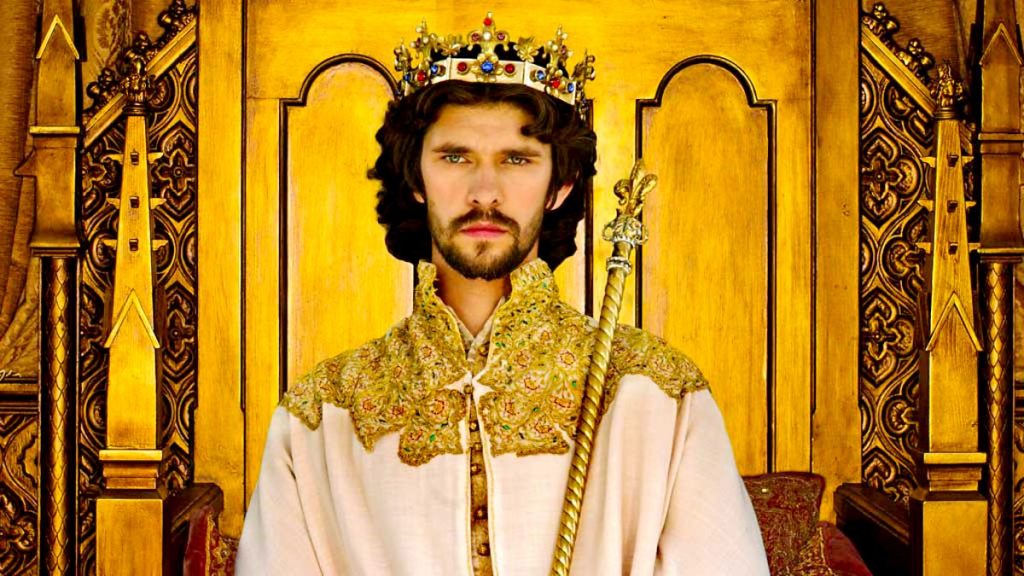
By the time his cousin Henry IV had usurped Richard (1399) there were just 4 small bites (20 – 100 square miles) of English territory left in France – around Calais in the north east, Bayonne and Bordeaux in the south west and Brest, right at the tip of Brittany in the north west.
And that’s the big 24 year gap, the back end of Richard’s reign where we had ceded pretty much everything, and Henry IV’s reign where he’s all tied up with domestic stuff and just staying on the throne he seized. And so we enter the final Lancastrian Phase (1415 -1453 of the Hundred Years War, the phase of the highest highs and the lowest lows.
Which starts with the brief, brilliant and entirely belligerent reign of Henry V.

Oh, his biggest victory may have been mainly due to the terrain, but if success if your metric then Henry V is your guy. He cements the Lancastrian Dynasty in England because suddenly he’s the guy you want to be related to. Kings want to be him, our Henry VIII in The Tudors has had the poster on his wall since Season 1.
Agincourt was just the start of an astonishingly successful and brutal campaign that had almost the whole of northern France under Henry’s control, including Paris. Henry was married to Catherine de Valois (future wife of Owen Tudor), daughter of Charles VI of France in 1420. Charles disinherited his fifth and last surviving son, and made Henry his heir, because he really had very little choice about it by that point. That son, Joan of Arc’s Dauphin and one day Charles VII, fought on and Henry was in a very dominant position but was still campaigning when he unexpectedly fell ill and died in 1422.
Things all fell apart in the reign of his son, Henry VI, who inherited at 10 months old and once he matured turned out to be ill suited to the job. By the mid 1450s it was all gone but Calais, and English honour was besmirched in a pretty spectacular way.
Back in the 1337 day, Edward III was pushed into war, quite heavily. He hung on through being disinherited from the French Crown, having to pay homage, and he took it all until Philip VI tried to take his lands as well. Edward was a medieval king, he could either declare war or just give up his balls altogether at that point. But there were a lot of points after that where you really wish we’d turned around.
Because if the cement was still barely drying on Salic Law when Edward III launched his first invasion, a country changing it’s law so you couldn’t inherit is a pretty clear ‘Non’ and a hundred years of war a foreign invader cured the hell out of it, and pile drove that interpretation of Salic Law into the foundations of the French monarchy. And given that we spent most of our time as quite brutal overlords and ended by burning their sacred virgin alive we really didn’t have a shred of honour left by the time we had also happened have united France in resistance as a nation and disembarked from everywhere but Calais in 1453.
Henry VI continued to be bad at the job of king, England fell into the Wars of the Roses and we are here because our Henry wants to be a new Henry V, be the one to reignite the dream and be revered through time for it.
You can tell Brandon is a fictional English commander because he gives a crap about conditions in the town. Brigitte manages to shock him with the news that international opinions of Henry are a little scathing.

It’s not that hard to confuse Brandon, but Brigitte has her own disadvantages. For a start the arguments she uses to obtain her freedom kind of misunderstand ‘war’.

But it’s not really her fault. She’s not actually a gritty survivor, or a window on the french experience, she’s a romantic interest, and her story is whatever it needs to be to appeal to Brandon, undergoing a fictional marital separation for half a season and God doesn’t want all this bod going to waste.

Briefly to Whitehall
We drop in on Bishop Gardiner, who is praying, entirely possibly for the death of his enemies, when Mr Risley drops in on him with the news of Hugh Latimer’s appointment.
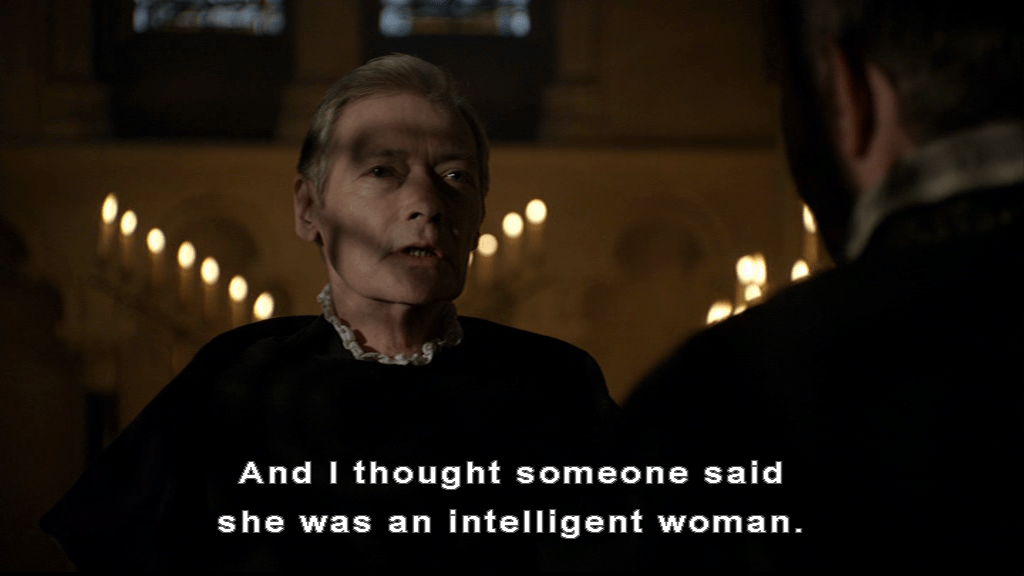
Mr Risley picks a side, Gardiner gets bitchy and the plots against the Queen tick forward.
Back to Boulogne
And then we’re back to Bolougne with a brief establishing shot.

We are here to see Harry and Richard who are relaxing in one of the larger tents.

They and their comrades are doing off duty soldiery things. They’re playing cards, someone’s got a recorder and they’re not bad with it. Harry talks to Richard about the digging, and how, while it’s heavy, he prefers the clay to the sand, for fear of being buried. Richard talks about his plans to shoot a French Officer that keeps popping outside to have a look at the English.
Harry then ambushes the conversation with a suggestion that there are …you know…women of negotiable affection around the camp. Richard takes the sensible approach.

And Harry reveals he wasn’t just suggesting procuring a prostitute, he was actually planning on adultery two seconds ago there, because he’s married, with a pregnant wife. He wants a boy. You can hear the rain outside while they are talking, and my lack of surprise just hanging out in the background.
He and Richard both hope they won’t be there too long. Apart from anything else, I’m not sure recorder guy has a second tune.
She’s a writer
The letter narration over the incoming montage is actual historical for the first half and taken from a quite famous letter Katherine sent to Henry at this time but the original (10) has been heavily edited and reordered, and new lines inserted. This is the interpretation of the opening lines.
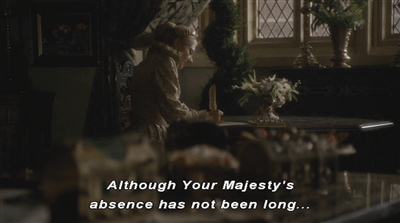
“The want of your presence, so much beloved and desired by me, makes me that I cannot quietly enjoy anything until I hear from your Majesty”(11)
“The time, therefore, seemeth to me very long with a great desire to know how Your Highness hath done since departing hence” (11) takes several levels of directness and becomes-

Then there’s a few invented lines, set over more montage moments- notably we see the hard work of Harry and Girolamo’s digging crew, the rain continues, soldiers fighting and manoeuvring, and Richard gets that officer.

Katherine winds to her conclusion.

as the letter ends, and Katherine signs off as she did actually historically, we see Henry drop the letter, convulsed, once again, from pain in his leg.

Then the music comes up to that choral, quasi-religious sound Trevor Morris uses, and the last time we heard it might have been when we were hanging around the top of York Minster.
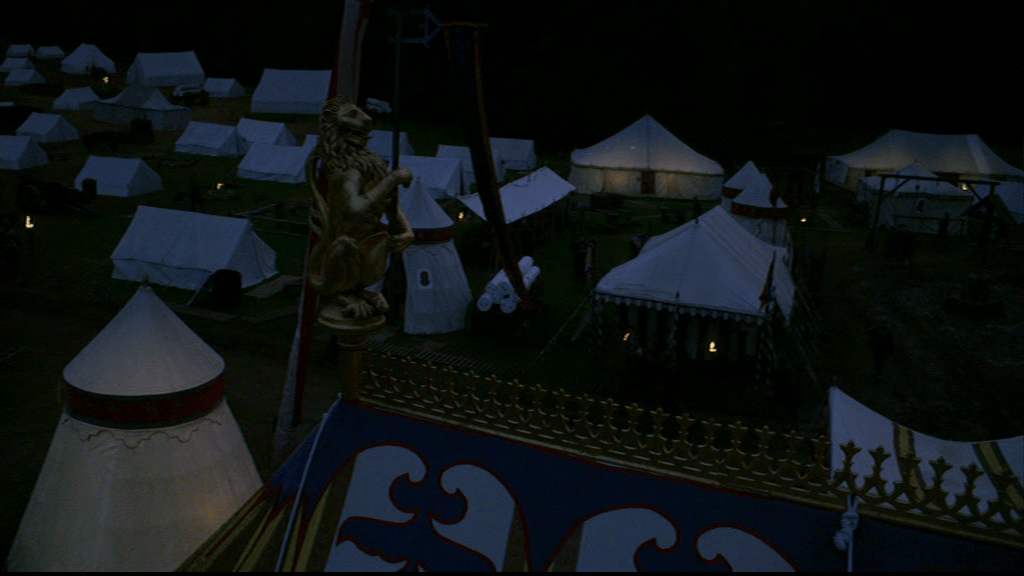
Our attention is drawn to the disposal of ‘night soil’ just out into the middle of the thoroughfare.

And our 21st Century brains have just been queued up to expect some disease incoming. That’s what the rest of this montage and the following scene are about, but, fun fact, the Bolougne seige wasn’t particularly known for disease problems. Sure, I mean there would have been some, but it wasn’t big problem this go around. They were far more worried about deserters. Still a ‘disease hits the beseigers’ montage is kind of expected so here we go.
We catch up with Harry, crossing right after the night soil, who apparently could not get his mind of getting his end away.
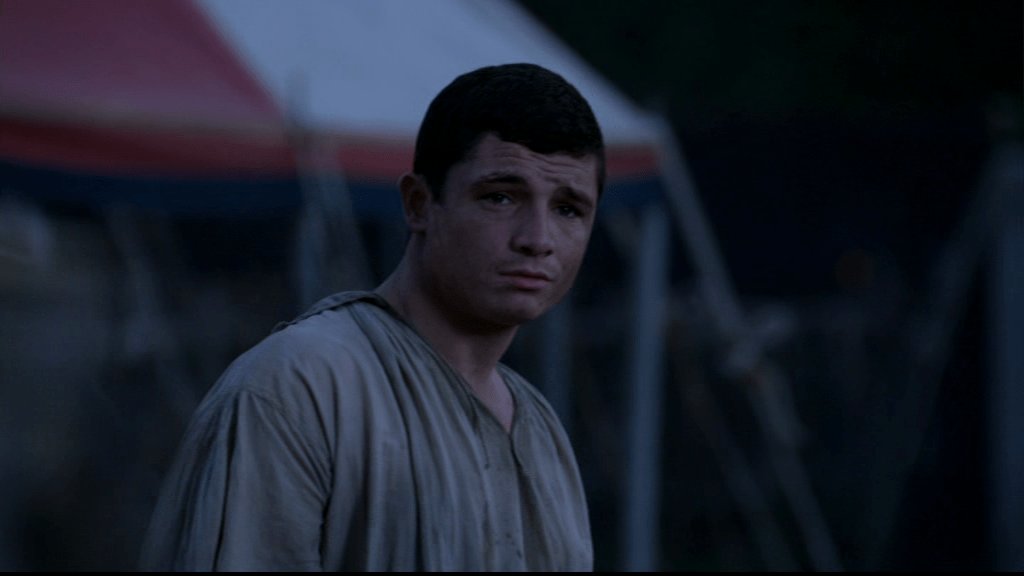
He catches the eye of a young and pretty sharp featured woman, and she’s a professional. She’s seen this expression before, this guy is money in the bank.

Except the music is working up to something, I think there might be some dramatrauma coming. The tableux we montage are of exhausted soldiers, of the dead being carried away, and the living just trying to get some warmth and rest.

Some just trying to process things like ‘head in his hands’ guy. Everything’s shot on a bit of an angle.
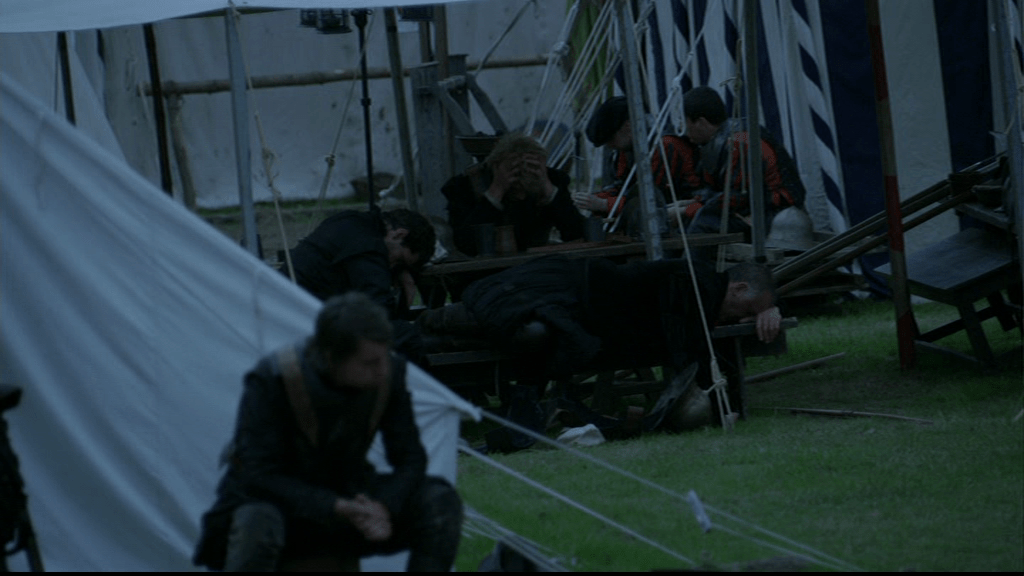
And our new friend the prostitute holds her sides, like…wow...something’s wrong.
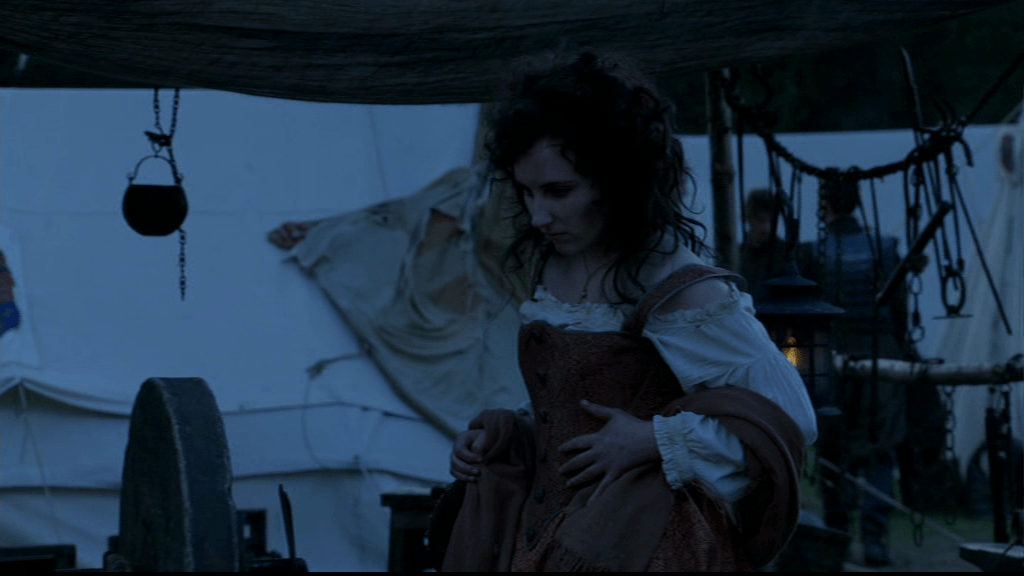
And she just collapses and dies instantly in front of Harry as the music scales some heights. Harry was not ready to handle this at all.

Mr Apparition
The figure walking down the camp thoroughfare is very intimidating.
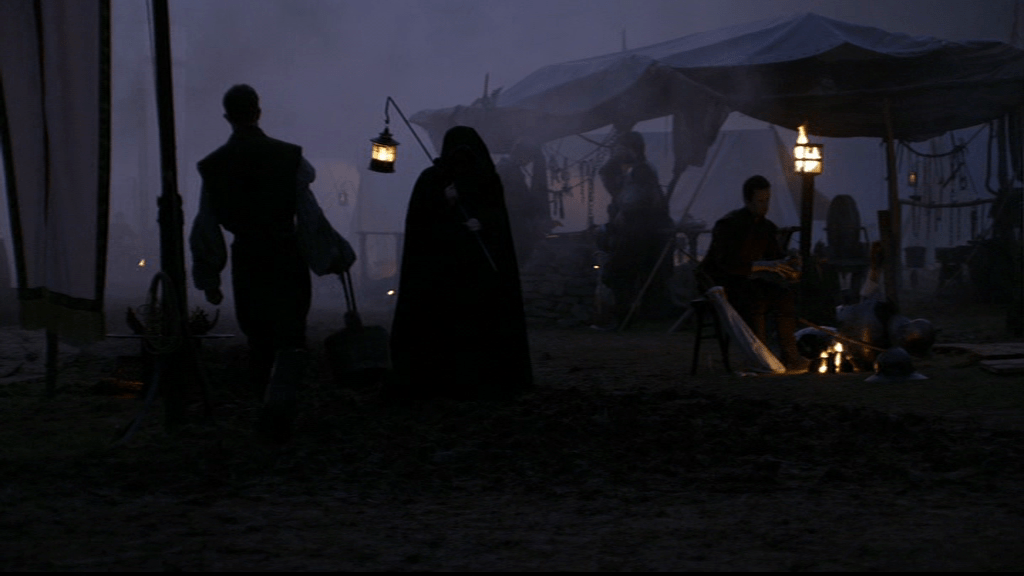
But his walking sequence suffers the same fate as some others in the camp. That of the subtitle writers not knowing what battles to take on, and which to leave. Which means the vague things shouted across camp are given full prominence, and at one point are surely misheard-
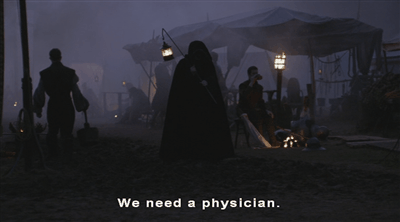
Before the effect is further ruined by the guy kind of fumbling getting his lantern in the lantern holder, and then remove his hood to reveal…

Inside, Girolamo is begging Henry for more time. He’s not even asking for resting time for the guys, just enough for them to shore up the roof a bit.

As a result Henry is desperate for distraction and not only notices, but calls the guy forward. He turns out to be Henry’s master surgeon.

Yeah, it’s not good news.

It’s pretty damn bad news, and like I said, not a noted major issue for the English in this campaign. But The Tudors is piling the pressure onto Henry. He takes the news better than he will later on but he needs to go outside for a bit.
Da Vinci’s Treviso
While Henry walks up to his siege pavilion, we catch up with Surrey and Brandon, playing some cards, and doing that subtle kind of strategizing colleagues sometimes do, you know? Those quietly careful conversations about things you’d feel happier knowing someone else knows, and maybe you could do with another opinion on.

And Surrey tells Brandon a story about Girolamo. It’s not actual historical, and paints him as a bit eccentric. Apparently Girolamo said if he could get a mirror large enough you could see Bolougne, down to the movements of shipping, from England.
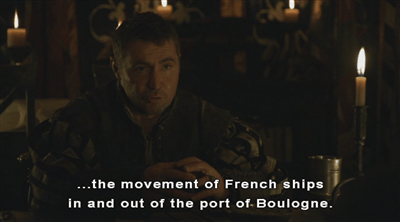
It feels curiously Da Vinci esque. Visionary, plausible and close to the future technology route – except for the flaw we can see from the future (No Girolamo – the future is lenses!). And it gives Surrey and Suffolk some tension to share, particularly with Surrey’s veiled “Not the only one who’s mad” reference.
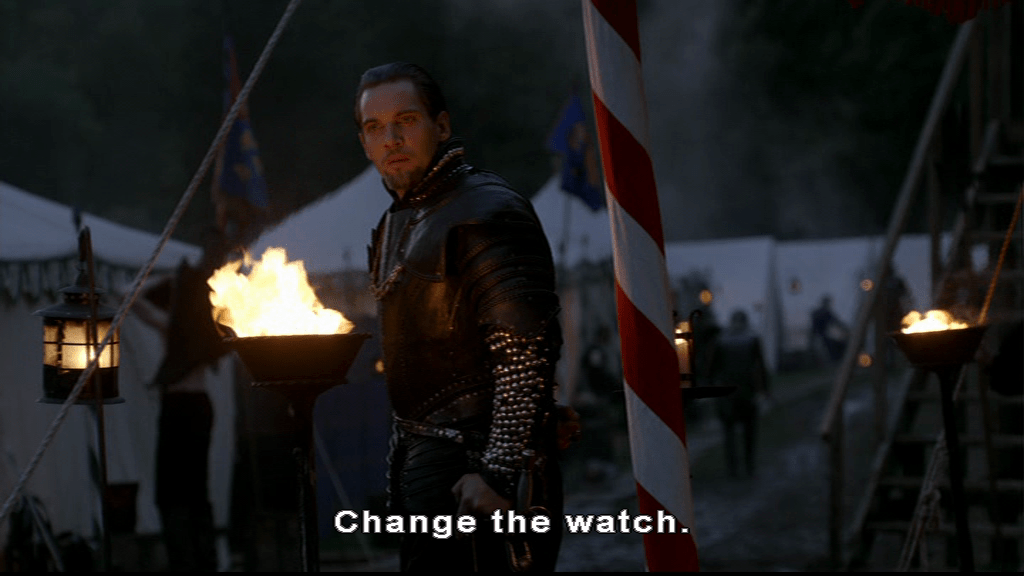
Henry, for once, was close to being reasonable. Bolougne should have been achievable. It was the next town down the road from Calais, he wasn’t trying to get a whole coastline . He wanted Paris, he tried for Montreuil as well , but Henry was probably always going to draw the line at Bolougne.
It was all of France he really knew, apart from his first campaign. It was where Francis had invited him to visit when Henry was trying to get French approval for his marriage to Anne Boleyn. Prosperous and close if anything was still achievable in France for the English, it had to be Bolougne.
Henry climbs into his pavilion, nad in the closest thing to privacy he gets, allows himself a little grunt of pain and to pant his breath back a bit as he reaches the top. And as Henry looks out over the smoking town still somehow holding out against him, and the drums tap away his impatience, I don’t think he’s leaving without taking it.

Edit : Oh wow, it is very late and this probably still needs work , certainly the last quarter. It’ll get a review and edit this week, but my editor is chugging a bit and I’ve been writing for nearly 8 hours. Peace out.
I have been picking at this one piecemeal. It’s taken an edit. 15/03/2022

Your recaps are always great and always worth reading multiple times. Thanks for the effort you put in!
LikeLiked by 2 people
“If you’re going in to take someone’s town, where their family lives, and their home and life is built they are going to hold out hard, and war is ugly anyway.”
Sooo… that’s topical 😥
LikeLiked by 2 people
Thank you so much for your amazing recaps! I just got caught up after finding out about your blog on Reddit. I was actually thinking about how I wanted to rewatch The Tudors recently and your posts are almost just as good. I look forward to reading more!
LikeLiked by 2 people
Sooo…I just attended a reception at the Henry VIII wine cellar beneath the MOD building, and later on…next week? Next weekend? I’m heading off to Thornbury Castle.
I feel that Tourism UK should give you a shout-out.
LikeLiked by 1 person
Where are the rest of the recaps? It only lets me read up until this one and there’s 10 episodes in season 10! Please come back, I love your reviews!
LikeLiked by 1 person
I read every entry from beginning to end over the course of two days. Outstanding! Thank you. Hope to see you finish them out….Shame to come so close and not wrap it up.
LikeLiked by 1 person